Nursing Care Plan for Self-Management of Crohn's Disease with Acute Exacerbation and Colostomy: SMART Goals and Interventions
VerifiedAdded on 2023/06/15
|6
|2065
|187
AI Summary
This nursing care plan focuses on self-management of Crohn's disease with acute exacerbation and colostomy. It includes SMART goals and interventions to promote evidence-based nursing care and holistic care for the patient.
Contribute Materials
Your contribution can guide someone’s learning journey. Share your
documents today.
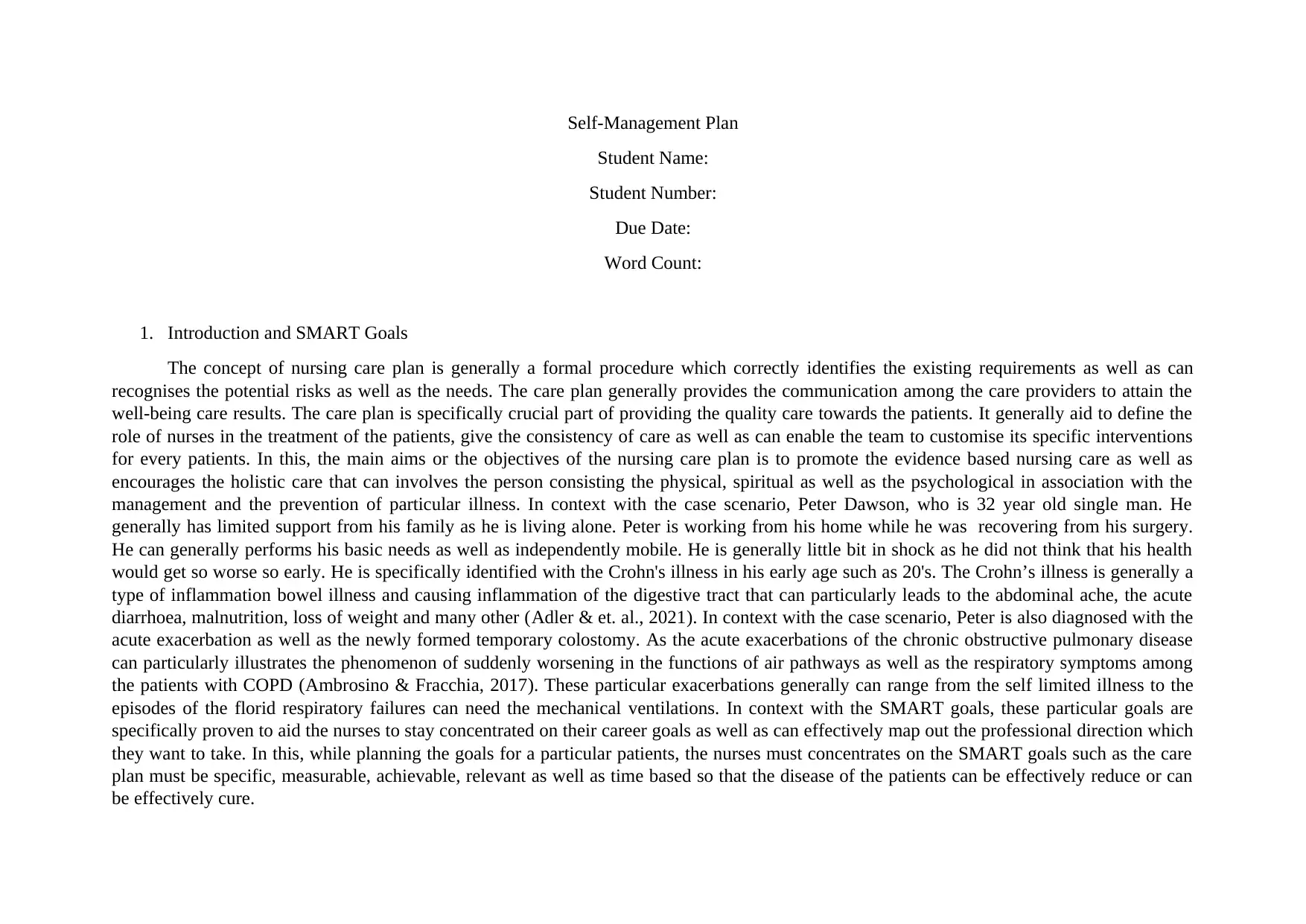
Self-Management Plan
Student Name:
Student Number:
Due Date:
Word Count:
1. Introduction and SMART Goals
The concept of nursing care plan is generally a formal procedure which correctly identifies the existing requirements as well as can
recognises the potential risks as well as the needs. The care plan generally provides the communication among the care providers to attain the
well-being care results. The care plan is specifically crucial part of providing the quality care towards the patients. It generally aid to define the
role of nurses in the treatment of the patients, give the consistency of care as well as can enable the team to customise its specific interventions
for every patients. In this, the main aims or the objectives of the nursing care plan is to promote the evidence based nursing care as well as
encourages the holistic care that can involves the person consisting the physical, spiritual as well as the psychological in association with the
management and the prevention of particular illness. In context with the case scenario, Peter Dawson, who is 32 year old single man. He
generally has limited support from his family as he is living alone. Peter is working from his home while he was recovering from his surgery.
He can generally performs his basic needs as well as independently mobile. He is generally little bit in shock as he did not think that his health
would get so worse so early. He is specifically identified with the Crohn's illness in his early age such as 20's. The Crohn’s illness is generally a
type of inflammation bowel illness and causing inflammation of the digestive tract that can particularly leads to the abdominal ache, the acute
diarrhoea, malnutrition, loss of weight and many other (Adler & et. al., 2021). In context with the case scenario, Peter is also diagnosed with the
acute exacerbation as well as the newly formed temporary colostomy. As the acute exacerbations of the chronic obstructive pulmonary disease
can particularly illustrates the phenomenon of suddenly worsening in the functions of air pathways as well as the respiratory symptoms among
the patients with COPD (Ambrosino & Fracchia, 2017). These particular exacerbations generally can range from the self limited illness to the
episodes of the florid respiratory failures can need the mechanical ventilations. In context with the SMART goals, these particular goals are
specifically proven to aid the nurses to stay concentrated on their career goals as well as can effectively map out the professional direction which
they want to take. In this, while planning the goals for a particular patients, the nurses must concentrates on the SMART goals such as the care
plan must be specific, measurable, achievable, relevant as well as time based so that the disease of the patients can be effectively reduce or can
be effectively cure.
Student Name:
Student Number:
Due Date:
Word Count:
1. Introduction and SMART Goals
The concept of nursing care plan is generally a formal procedure which correctly identifies the existing requirements as well as can
recognises the potential risks as well as the needs. The care plan generally provides the communication among the care providers to attain the
well-being care results. The care plan is specifically crucial part of providing the quality care towards the patients. It generally aid to define the
role of nurses in the treatment of the patients, give the consistency of care as well as can enable the team to customise its specific interventions
for every patients. In this, the main aims or the objectives of the nursing care plan is to promote the evidence based nursing care as well as
encourages the holistic care that can involves the person consisting the physical, spiritual as well as the psychological in association with the
management and the prevention of particular illness. In context with the case scenario, Peter Dawson, who is 32 year old single man. He
generally has limited support from his family as he is living alone. Peter is working from his home while he was recovering from his surgery.
He can generally performs his basic needs as well as independently mobile. He is generally little bit in shock as he did not think that his health
would get so worse so early. He is specifically identified with the Crohn's illness in his early age such as 20's. The Crohn’s illness is generally a
type of inflammation bowel illness and causing inflammation of the digestive tract that can particularly leads to the abdominal ache, the acute
diarrhoea, malnutrition, loss of weight and many other (Adler & et. al., 2021). In context with the case scenario, Peter is also diagnosed with the
acute exacerbation as well as the newly formed temporary colostomy. As the acute exacerbations of the chronic obstructive pulmonary disease
can particularly illustrates the phenomenon of suddenly worsening in the functions of air pathways as well as the respiratory symptoms among
the patients with COPD (Ambrosino & Fracchia, 2017). These particular exacerbations generally can range from the self limited illness to the
episodes of the florid respiratory failures can need the mechanical ventilations. In context with the SMART goals, these particular goals are
specifically proven to aid the nurses to stay concentrated on their career goals as well as can effectively map out the professional direction which
they want to take. In this, while planning the goals for a particular patients, the nurses must concentrates on the SMART goals such as the care
plan must be specific, measurable, achievable, relevant as well as time based so that the disease of the patients can be effectively reduce or can
be effectively cure.
Secure Best Marks with AI Grader
Need help grading? Try our AI Grader for instant feedback on your assignments.
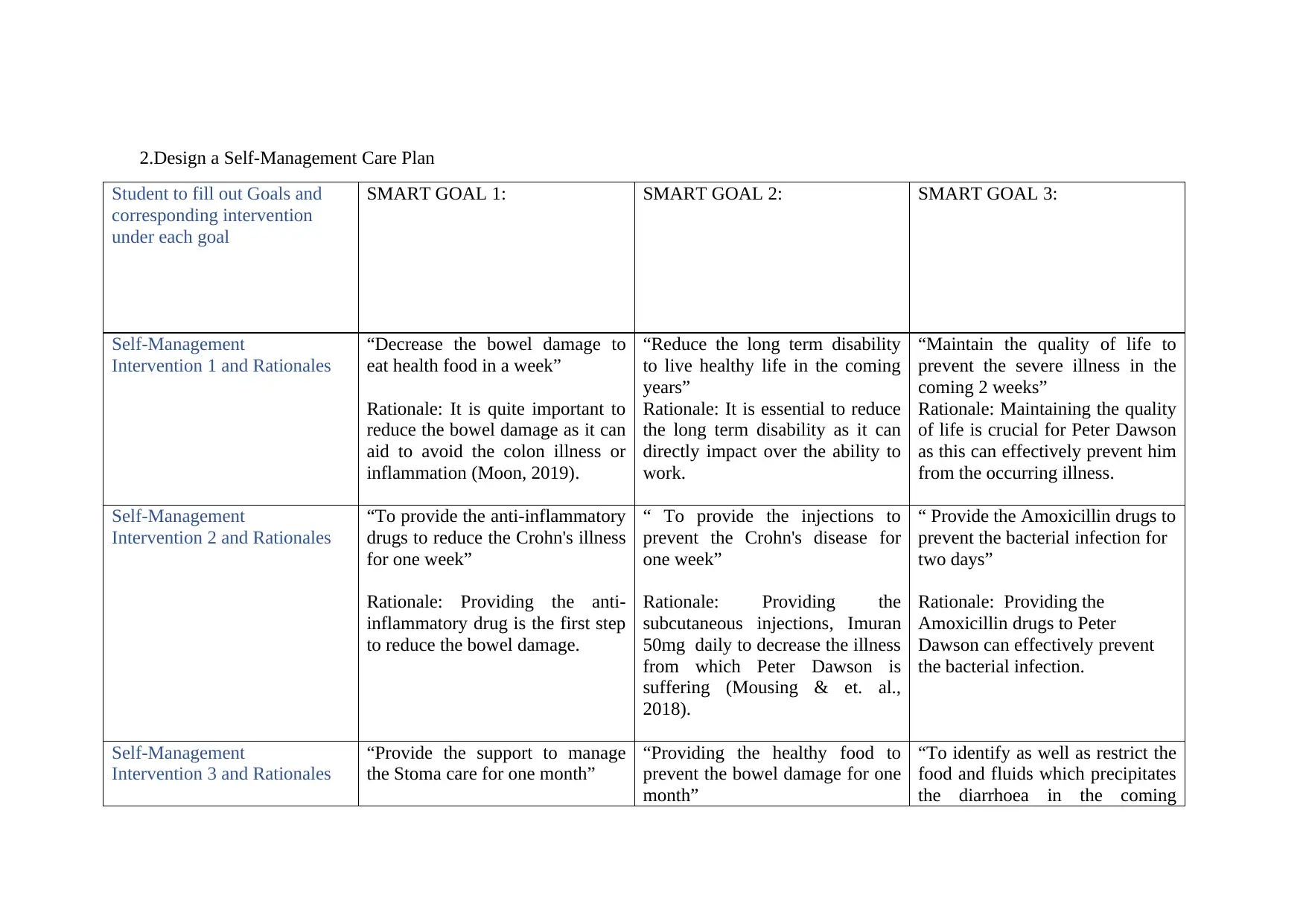
2.Design a Self-Management Care Plan
Student to fill out Goals and
corresponding intervention
under each goal
SMART GOAL 1: SMART GOAL 2: SMART GOAL 3:
Self-Management
Intervention 1 and Rationales
“Decrease the bowel damage to
eat health food in a week”
Rationale: It is quite important to
reduce the bowel damage as it can
aid to avoid the colon illness or
inflammation (Moon, 2019).
“Reduce the long term disability
to live healthy life in the coming
years”
Rationale: It is essential to reduce
the long term disability as it can
directly impact over the ability to
work.
“Maintain the quality of life to
prevent the severe illness in the
coming 2 weeks”
Rationale: Maintaining the quality
of life is crucial for Peter Dawson
as this can effectively prevent him
from the occurring illness.
Self-Management
Intervention 2 and Rationales
“To provide the anti-inflammatory
drugs to reduce the Crohn's illness
for one week”
Rationale: Providing the anti-
inflammatory drug is the first step
to reduce the bowel damage.
“ To provide the injections to
prevent the Crohn's disease for
one week”
Rationale: Providing the
subcutaneous injections, Imuran
50mg daily to decrease the illness
from which Peter Dawson is
suffering (Mousing & et. al.,
2018).
“ Provide the Amoxicillin drugs to
prevent the bacterial infection for
two days”
Rationale: Providing the
Amoxicillin drugs to Peter
Dawson can effectively prevent
the bacterial infection.
Self-Management
Intervention 3 and Rationales
“Provide the support to manage
the Stoma care for one month”
“Providing the healthy food to
prevent the bowel damage for one
month”
“To identify as well as restrict the
food and fluids which precipitates
the diarrhoea in the coming
Student to fill out Goals and
corresponding intervention
under each goal
SMART GOAL 1: SMART GOAL 2: SMART GOAL 3:
Self-Management
Intervention 1 and Rationales
“Decrease the bowel damage to
eat health food in a week”
Rationale: It is quite important to
reduce the bowel damage as it can
aid to avoid the colon illness or
inflammation (Moon, 2019).
“Reduce the long term disability
to live healthy life in the coming
years”
Rationale: It is essential to reduce
the long term disability as it can
directly impact over the ability to
work.
“Maintain the quality of life to
prevent the severe illness in the
coming 2 weeks”
Rationale: Maintaining the quality
of life is crucial for Peter Dawson
as this can effectively prevent him
from the occurring illness.
Self-Management
Intervention 2 and Rationales
“To provide the anti-inflammatory
drugs to reduce the Crohn's illness
for one week”
Rationale: Providing the anti-
inflammatory drug is the first step
to reduce the bowel damage.
“ To provide the injections to
prevent the Crohn's disease for
one week”
Rationale: Providing the
subcutaneous injections, Imuran
50mg daily to decrease the illness
from which Peter Dawson is
suffering (Mousing & et. al.,
2018).
“ Provide the Amoxicillin drugs to
prevent the bacterial infection for
two days”
Rationale: Providing the
Amoxicillin drugs to Peter
Dawson can effectively prevent
the bacterial infection.
Self-Management
Intervention 3 and Rationales
“Provide the support to manage
the Stoma care for one month”
“Providing the healthy food to
prevent the bowel damage for one
month”
“To identify as well as restrict the
food and fluids which precipitates
the diarrhoea in the coming
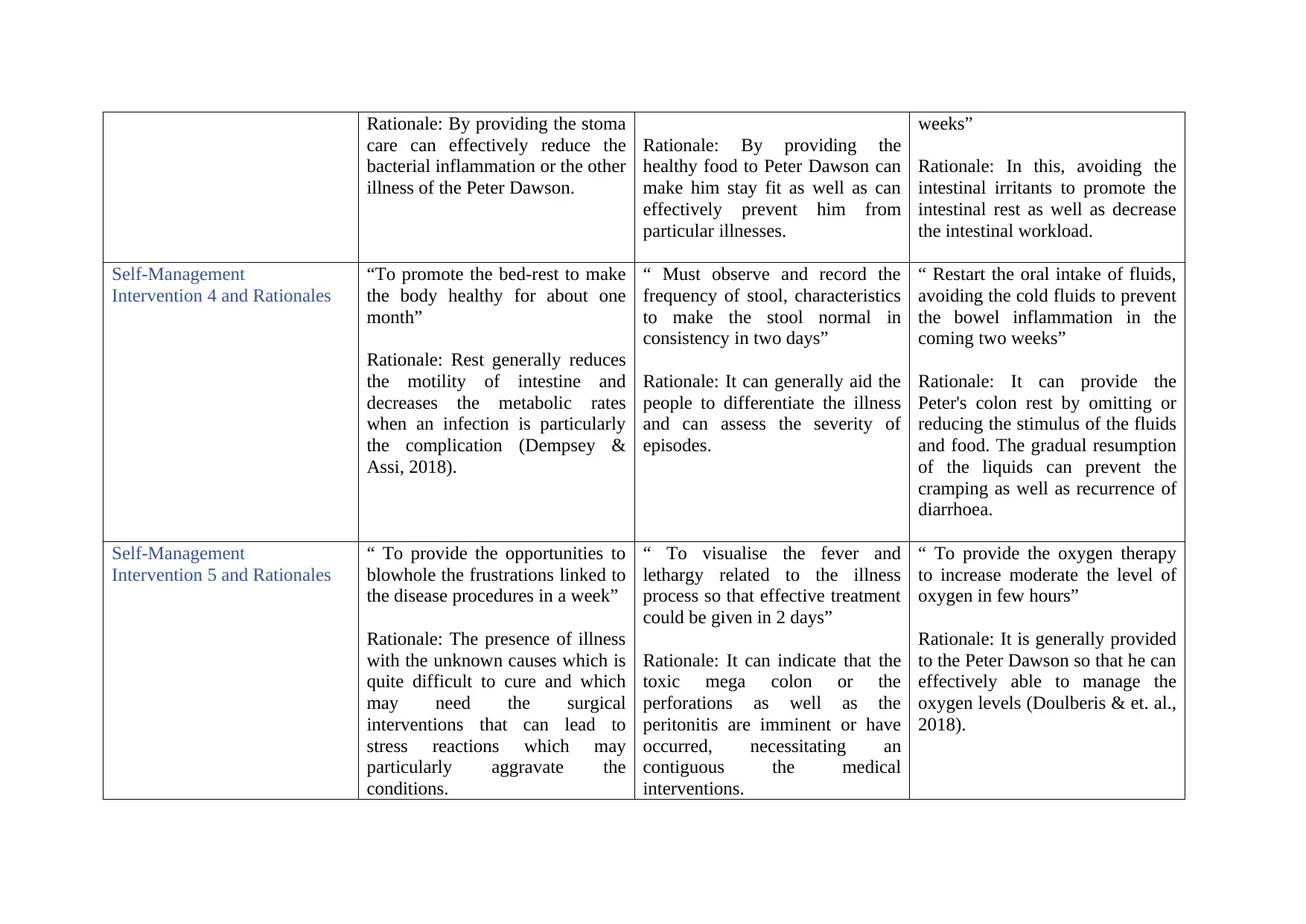
Rationale: By providing the stoma
care can effectively reduce the
bacterial inflammation or the other
illness of the Peter Dawson.
Rationale: By providing the
healthy food to Peter Dawson can
make him stay fit as well as can
effectively prevent him from
particular illnesses.
weeks”
Rationale: In this, avoiding the
intestinal irritants to promote the
intestinal rest as well as decrease
the intestinal workload.
Self-Management
Intervention 4 and Rationales
“To promote the bed-rest to make
the body healthy for about one
month”
Rationale: Rest generally reduces
the motility of intestine and
decreases the metabolic rates
when an infection is particularly
the complication (Dempsey &
Assi, 2018).
“ Must observe and record the
frequency of stool, characteristics
to make the stool normal in
consistency in two days”
Rationale: It can generally aid the
people to differentiate the illness
and can assess the severity of
episodes.
“ Restart the oral intake of fluids,
avoiding the cold fluids to prevent
the bowel inflammation in the
coming two weeks”
Rationale: It can provide the
Peter's colon rest by omitting or
reducing the stimulus of the fluids
and food. The gradual resumption
of the liquids can prevent the
cramping as well as recurrence of
diarrhoea.
Self-Management
Intervention 5 and Rationales
“ To provide the opportunities to
blowhole the frustrations linked to
the disease procedures in a week”
Rationale: The presence of illness
with the unknown causes which is
quite difficult to cure and which
may need the surgical
interventions that can lead to
stress reactions which may
particularly aggravate the
conditions.
“ To visualise the fever and
lethargy related to the illness
process so that effective treatment
could be given in 2 days”
Rationale: It can indicate that the
toxic mega colon or the
perforations as well as the
peritonitis are imminent or have
occurred, necessitating an
contiguous the medical
interventions.
“ To provide the oxygen therapy
to increase moderate the level of
oxygen in few hours”
Rationale: It is generally provided
to the Peter Dawson so that he can
effectively able to manage the
oxygen levels (Doulberis & et. al.,
2018).
care can effectively reduce the
bacterial inflammation or the other
illness of the Peter Dawson.
Rationale: By providing the
healthy food to Peter Dawson can
make him stay fit as well as can
effectively prevent him from
particular illnesses.
weeks”
Rationale: In this, avoiding the
intestinal irritants to promote the
intestinal rest as well as decrease
the intestinal workload.
Self-Management
Intervention 4 and Rationales
“To promote the bed-rest to make
the body healthy for about one
month”
Rationale: Rest generally reduces
the motility of intestine and
decreases the metabolic rates
when an infection is particularly
the complication (Dempsey &
Assi, 2018).
“ Must observe and record the
frequency of stool, characteristics
to make the stool normal in
consistency in two days”
Rationale: It can generally aid the
people to differentiate the illness
and can assess the severity of
episodes.
“ Restart the oral intake of fluids,
avoiding the cold fluids to prevent
the bowel inflammation in the
coming two weeks”
Rationale: It can provide the
Peter's colon rest by omitting or
reducing the stimulus of the fluids
and food. The gradual resumption
of the liquids can prevent the
cramping as well as recurrence of
diarrhoea.
Self-Management
Intervention 5 and Rationales
“ To provide the opportunities to
blowhole the frustrations linked to
the disease procedures in a week”
Rationale: The presence of illness
with the unknown causes which is
quite difficult to cure and which
may need the surgical
interventions that can lead to
stress reactions which may
particularly aggravate the
conditions.
“ To visualise the fever and
lethargy related to the illness
process so that effective treatment
could be given in 2 days”
Rationale: It can indicate that the
toxic mega colon or the
perforations as well as the
peritonitis are imminent or have
occurred, necessitating an
contiguous the medical
interventions.
“ To provide the oxygen therapy
to increase moderate the level of
oxygen in few hours”
Rationale: It is generally provided
to the Peter Dawson so that he can
effectively able to manage the
oxygen levels (Doulberis & et. al.,
2018).

Secure Best Marks with AI Grader
Need help grading? Try our AI Grader for instant feedback on your assignments.
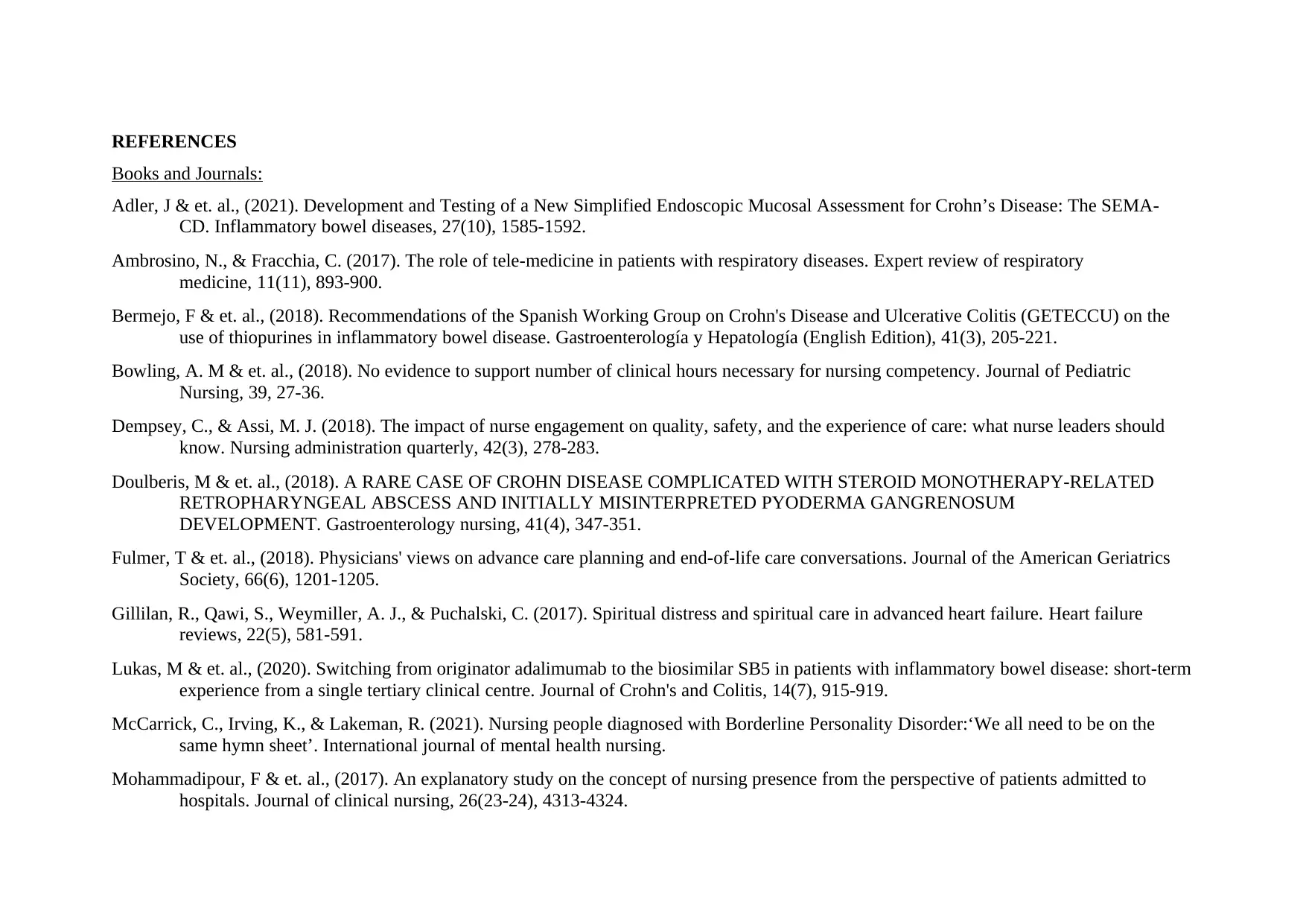
REFERENCES
Books and Journals:
Adler, J & et. al., (2021). Development and Testing of a New Simplified Endoscopic Mucosal Assessment for Crohn’s Disease: The SEMA-
CD. Inflammatory bowel diseases, 27(10), 1585-1592.
Ambrosino, N., & Fracchia, C. (2017). The role of tele-medicine in patients with respiratory diseases. Expert review of respiratory
medicine, 11(11), 893-900.
Bermejo, F & et. al., (2018). Recommendations of the Spanish Working Group on Crohn's Disease and Ulcerative Colitis (GETECCU) on the
use of thiopurines in inflammatory bowel disease. Gastroenterología y Hepatología (English Edition), 41(3), 205-221.
Bowling, A. M & et. al., (2018). No evidence to support number of clinical hours necessary for nursing competency. Journal of Pediatric
Nursing, 39, 27-36.
Dempsey, C., & Assi, M. J. (2018). The impact of nurse engagement on quality, safety, and the experience of care: what nurse leaders should
know. Nursing administration quarterly, 42(3), 278-283.
Doulberis, M & et. al., (2018). A RARE CASE OF CROHN DISEASE COMPLICATED WITH STEROID MONOTHERAPY-RELATED
RETROPHARYNGEAL ABSCESS AND INITIALLY MISINTERPRETED PYODERMA GANGRENOSUM
DEVELOPMENT. Gastroenterology nursing, 41(4), 347-351.
Fulmer, T & et. al., (2018). Physicians' views on advance care planning and end‐of‐life care conversations. Journal of the American Geriatrics
Society, 66(6), 1201-1205.
Gillilan, R., Qawi, S., Weymiller, A. J., & Puchalski, C. (2017). Spiritual distress and spiritual care in advanced heart failure. Heart failure
reviews, 22(5), 581-591.
Lukas, M & et. al., (2020). Switching from originator adalimumab to the biosimilar SB5 in patients with inflammatory bowel disease: short-term
experience from a single tertiary clinical centre. Journal of Crohn's and Colitis, 14(7), 915-919.
McCarrick, C., Irving, K., & Lakeman, R. (2021). Nursing people diagnosed with Borderline Personality Disorder:‘We all need to be on the
same hymn sheet’. International journal of mental health nursing.
Mohammadipour, F & et. al., (2017). An explanatory study on the concept of nursing presence from the perspective of patients admitted to
hospitals. Journal of clinical nursing, 26(23-24), 4313-4324.
Books and Journals:
Adler, J & et. al., (2021). Development and Testing of a New Simplified Endoscopic Mucosal Assessment for Crohn’s Disease: The SEMA-
CD. Inflammatory bowel diseases, 27(10), 1585-1592.
Ambrosino, N., & Fracchia, C. (2017). The role of tele-medicine in patients with respiratory diseases. Expert review of respiratory
medicine, 11(11), 893-900.
Bermejo, F & et. al., (2018). Recommendations of the Spanish Working Group on Crohn's Disease and Ulcerative Colitis (GETECCU) on the
use of thiopurines in inflammatory bowel disease. Gastroenterología y Hepatología (English Edition), 41(3), 205-221.
Bowling, A. M & et. al., (2018). No evidence to support number of clinical hours necessary for nursing competency. Journal of Pediatric
Nursing, 39, 27-36.
Dempsey, C., & Assi, M. J. (2018). The impact of nurse engagement on quality, safety, and the experience of care: what nurse leaders should
know. Nursing administration quarterly, 42(3), 278-283.
Doulberis, M & et. al., (2018). A RARE CASE OF CROHN DISEASE COMPLICATED WITH STEROID MONOTHERAPY-RELATED
RETROPHARYNGEAL ABSCESS AND INITIALLY MISINTERPRETED PYODERMA GANGRENOSUM
DEVELOPMENT. Gastroenterology nursing, 41(4), 347-351.
Fulmer, T & et. al., (2018). Physicians' views on advance care planning and end‐of‐life care conversations. Journal of the American Geriatrics
Society, 66(6), 1201-1205.
Gillilan, R., Qawi, S., Weymiller, A. J., & Puchalski, C. (2017). Spiritual distress and spiritual care in advanced heart failure. Heart failure
reviews, 22(5), 581-591.
Lukas, M & et. al., (2020). Switching from originator adalimumab to the biosimilar SB5 in patients with inflammatory bowel disease: short-term
experience from a single tertiary clinical centre. Journal of Crohn's and Colitis, 14(7), 915-919.
McCarrick, C., Irving, K., & Lakeman, R. (2021). Nursing people diagnosed with Borderline Personality Disorder:‘We all need to be on the
same hymn sheet’. International journal of mental health nursing.
Mohammadipour, F & et. al., (2017). An explanatory study on the concept of nursing presence from the perspective of patients admitted to
hospitals. Journal of clinical nursing, 26(23-24), 4313-4324.
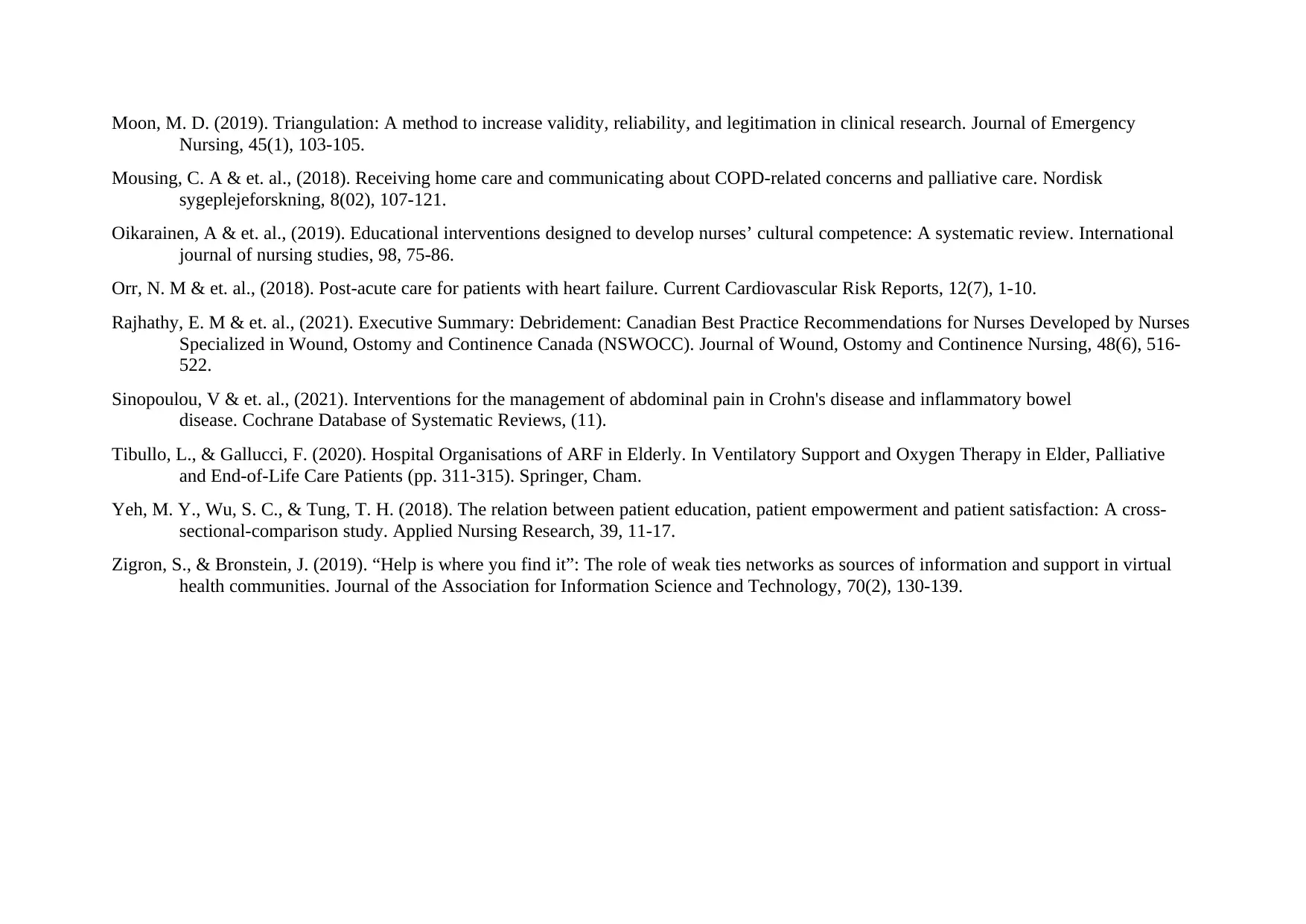
Moon, M. D. (2019). Triangulation: A method to increase validity, reliability, and legitimation in clinical research. Journal of Emergency
Nursing, 45(1), 103-105.
Mousing, C. A & et. al., (2018). Receiving home care and communicating about COPD-related concerns and palliative care. Nordisk
sygeplejeforskning, 8(02), 107-121.
Oikarainen, A & et. al., (2019). Educational interventions designed to develop nurses’ cultural competence: A systematic review. International
journal of nursing studies, 98, 75-86.
Orr, N. M & et. al., (2018). Post-acute care for patients with heart failure. Current Cardiovascular Risk Reports, 12(7), 1-10.
Rajhathy, E. M & et. al., (2021). Executive Summary: Debridement: Canadian Best Practice Recommendations for Nurses Developed by Nurses
Specialized in Wound, Ostomy and Continence Canada (NSWOCC). Journal of Wound, Ostomy and Continence Nursing, 48(6), 516-
522.
Sinopoulou, V & et. al., (2021). Interventions for the management of abdominal pain in Crohn's disease and inflammatory bowel
disease. Cochrane Database of Systematic Reviews, (11).
Tibullo, L., & Gallucci, F. (2020). Hospital Organisations of ARF in Elderly. In Ventilatory Support and Oxygen Therapy in Elder, Palliative
and End-of-Life Care Patients (pp. 311-315). Springer, Cham.
Yeh, M. Y., Wu, S. C., & Tung, T. H. (2018). The relation between patient education, patient empowerment and patient satisfaction: A cross-
sectional-comparison study. Applied Nursing Research, 39, 11-17.
Zigron, S., & Bronstein, J. (2019). “Help is where you find it”: The role of weak ties networks as sources of information and support in virtual
health communities. Journal of the Association for Information Science and Technology, 70(2), 130-139.
Nursing, 45(1), 103-105.
Mousing, C. A & et. al., (2018). Receiving home care and communicating about COPD-related concerns and palliative care. Nordisk
sygeplejeforskning, 8(02), 107-121.
Oikarainen, A & et. al., (2019). Educational interventions designed to develop nurses’ cultural competence: A systematic review. International
journal of nursing studies, 98, 75-86.
Orr, N. M & et. al., (2018). Post-acute care for patients with heart failure. Current Cardiovascular Risk Reports, 12(7), 1-10.
Rajhathy, E. M & et. al., (2021). Executive Summary: Debridement: Canadian Best Practice Recommendations for Nurses Developed by Nurses
Specialized in Wound, Ostomy and Continence Canada (NSWOCC). Journal of Wound, Ostomy and Continence Nursing, 48(6), 516-
522.
Sinopoulou, V & et. al., (2021). Interventions for the management of abdominal pain in Crohn's disease and inflammatory bowel
disease. Cochrane Database of Systematic Reviews, (11).
Tibullo, L., & Gallucci, F. (2020). Hospital Organisations of ARF in Elderly. In Ventilatory Support and Oxygen Therapy in Elder, Palliative
and End-of-Life Care Patients (pp. 311-315). Springer, Cham.
Yeh, M. Y., Wu, S. C., & Tung, T. H. (2018). The relation between patient education, patient empowerment and patient satisfaction: A cross-
sectional-comparison study. Applied Nursing Research, 39, 11-17.
Zigron, S., & Bronstein, J. (2019). “Help is where you find it”: The role of weak ties networks as sources of information and support in virtual
health communities. Journal of the Association for Information Science and Technology, 70(2), 130-139.
1 out of 6
Related Documents
Your All-in-One AI-Powered Toolkit for Academic Success.
+13062052269
info@desklib.com
Available 24*7 on WhatsApp / Email
![[object Object]](/_next/static/media/star-bottom.7253800d.svg)
Unlock your academic potential
© 2024 | Zucol Services PVT LTD | All rights reserved.





